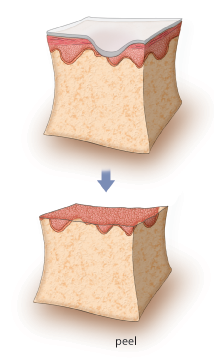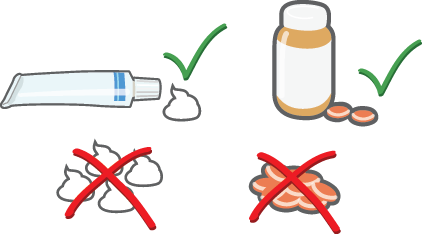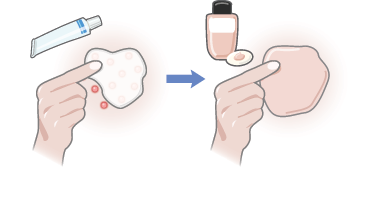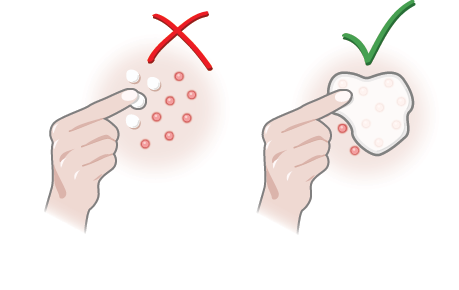MEDICATIONS FOR ACNE
 Treatment for acne has several goals: to heal pimples, to prevent pimples (by decreasing sebum production, killing bacteria, and normalizing skin shedding), and to prevent scarring.1,6
Treatment for acne has several goals: to heal pimples, to prevent pimples (by decreasing sebum production, killing bacteria, and normalizing skin shedding), and to prevent scarring.1,6- Over-the-counter (OTC) or prescription drugs may be used.
- Some drugs are topical (on the skin) treatments. Examples include salicylic acid and benzoyl peroxide and, to a lesser extent, antibiotics (erythromycin, clindamycin), retinoids (tretinoin, adapalene, tazarotene), and anti-inflammatories.3,6
- Other drugs, such as some antibiotics (tetracycline, minocycline) and isotretinoin (a retinoid), are taken in pill form.3,6
- For some women, oral contraceptives are effective at controlling acne.3,6
- Chemical peels and laser treatments have also shown some effectiveness.3
- For more severe forms of acne, isotretinoin and/or oral steroids are often prescribed.2
ARE THE MEDICATIONS FOR ACNE SAFE?
 Some treatments for acne, such as oral antibiotics, can make people more susceptible to sunburn. Check with your pharmacist to see if you need to be especially careful when in the sun.
Some treatments for acne, such as oral antibiotics, can make people more susceptible to sunburn. Check with your pharmacist to see if you need to be especially careful when in the sun.- Some products such as OTC creams containing benzoyl peroxide, sulphur, resorcinol, or salicylic acid can initially cause skin irritation, flaking, and drying, but this often goes away after about a month.4
- Prescription creams can sometimes cause stinging, burning/redness, or peeling. A gradual, rather than sudden, increase in dose or switching to another medication may help.4
- Some oral antibiotics can cause stomach upset, dizziness, or even skin discolouration.4
- Some oral antibiotics can reduce the effectiveness of birth control pills.
- Isotretinoin can cause severe birth defects. Therefore, women who are or might become pregnant, or who are breastfeeding, should not use isotretinoin.4,6
 Isotretinoin has also been associated with depression and the risk of suicide.4,6 If you are taking isotretinoin and are feeling particularly sad, contact your doctor right away.
Isotretinoin has also been associated with depression and the risk of suicide.4,6 If you are taking isotretinoin and are feeling particularly sad, contact your doctor right away.
POINTS TO REMEMBER ABOUT ACNE MEDICATION
 It may be weeks to months after starting a medication before you see an improvement. Give it time.5
It may be weeks to months after starting a medication before you see an improvement. Give it time.5- Using more medication (e.g., applying more often than prescribed, taking more pills) will not clear up your acne faster. However, it will increase the odds that you will experience unpleasant side effects.5,6
- Use topical creams on the entire affected area, not just on the pimples themselves, as the cream will work to prevent pimples from occurring.5

- Apply your acne medication before applying makeup.6


- If your skin has cleared up, talk with your doctor before stopping your medication.5
 Some oral medications are best taken at a particular time of day (e.g., with a meal). Check with your doctor or pharmacist.5
Some oral medications are best taken at a particular time of day (e.g., with a meal). Check with your doctor or pharmacist.5- If you forget to take your medication, check with your doctor or pharmacist regarding doubling up the next day or just skipping the dose.5
REFERENCES
- US National Institute of Arthritis and Musculoskeletal and Skin Diseases. What is acne? Bethesda (MD): The Institute, 2010; http://www.niams.nih.gov/health_info/acne/acne_ff.pdf. Accessed January 18, 2013.
- Acne.org. What is acne? San Francisco (CA): Daniel Kern Inc, n.d.; http://www.acne.org/whatisacne.html. Accessed January 19, 2013.
- Acne.org. Treatment options. San Francisco (CA): Daniel Kern Inc, n.d.; http://www.acne.org/treatments.html. Accessed January 19, 2013.
- Mayo Clinic. Acne: treatments and drugs. Rochester (MN): The Clinic, 2011; http://www.mayoclinic.com/health/acne/DS00169/DSECTION=treatments-and-drugs. Accessed January 20, 2013.
- SkinCarePhysicians.com. Frequently asked questions about acne. Schaumburg (IL): American Academy of Dermatology, 2011; http://www.skincarephysicians.com/acnenet/faq.html. Accessed January 21, 2013.
- Canadian Dermatology Association. Acne. Ottawa (ON): The Association, n.d.; http://www.dermatology.ca/skin-hair-nails/skin/acne/. Accessed January 23, 2013.
 Treatment for acne has several goals: to heal pimples, to prevent pimples (by decreasing sebum production, killing bacteria, and normalizing skin shedding), and to prevent scarring.1,6
Treatment for acne has several goals: to heal pimples, to prevent pimples (by decreasing sebum production, killing bacteria, and normalizing skin shedding), and to prevent scarring.1,6 Some treatments for acne, such as oral antibiotics, can make people more susceptible to sunburn. Check with your pharmacist to see if you need to be especially careful when in the sun.
Some treatments for acne, such as oral antibiotics, can make people more susceptible to sunburn. Check with your pharmacist to see if you need to be especially careful when in the sun. Isotretinoin has also been associated with depression and the risk of suicide.4,6 If you are taking isotretinoin and are feeling particularly sad, contact your doctor right away.
Isotretinoin has also been associated with depression and the risk of suicide.4,6 If you are taking isotretinoin and are feeling particularly sad, contact your doctor right away. It may be weeks to months after starting a medication before you see an improvement. Give it time.5
It may be weeks to months after starting a medication before you see an improvement. Give it time.5


 Some oral medications are best taken at a particular time of day (e.g., with a meal). Check with your doctor or pharmacist.5
Some oral medications are best taken at a particular time of day (e.g., with a meal). Check with your doctor or pharmacist.5